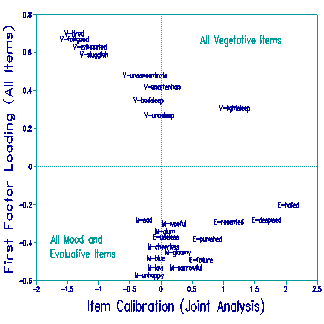
Does an instrument maintain its measurement characteristics in a
new situation? A particular medical condition can interact with
test items at three intensity levels:
(i) to introduce minor perturbations in the observations, with no practical import;
(ii) to provide diagnostically useful misfit, but without degrading the
validity of the overall measures,
(iii) to fracture the instrument
into two or more subsets of items producing incompatible measures.
When an instrument is designed to produce measures of more than one
attribute, interactions with medical conditions may obscure the
distinctions between the measures.
The Chicago Multiscale Depression Inventory (CMDI; Nyenhuis et al., in press) is designed to produce three distinct measures for three aspects of depression: Mood (9 items), Evaluative symptoms (6 items) and Vegetative symptoms (9 items). Items are one word or a brief phrase that describe a symptom of depression. Data were collected from 433 multiple sclerosis patients. Patients rated how they felt during the last week on a 5-point scale, from 1 ("Not at all") to 5 ("Extremely"). All items were combined into one Rasch analysis, followed by a principal component analysis of the standardized residuals. Items identified as loading on the first factor (or component) in the residuals were excluded from subsequent factors. The utility of the instrument for MS patients would be supported if the factor structure reflected the instrument's intended functioning.

Figure 1 shows that the first factor in the residuals contrasts the 9 Vegetative items against the others. After removal of the Vegetative items from the analysis, the first factor contrasts, in Figure 2, the Evaluative against the Mood items. The item difficulty hierarchies can be examined to confirm the stability of the construct definitions.
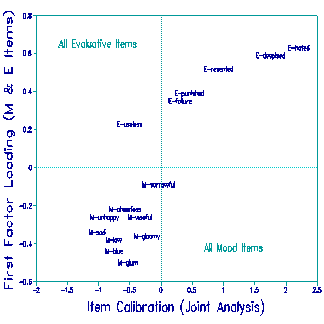
The practical implications of these three factors can be investigated by constructing 3 measures for each patient, one for each subset of items. The Figures opposite show the relationships between the three sets of person measures. They are correlated across patients, confirming that they converge to measure "depression" when it is useful to regard all items as measuring one variable. The relationship between Evaluative and Mood symptoms (bottom Figure) is strongest, reflecting their clear distinction from Vegetative symptoms in Figure 1. Overall, the structure of the CMDI has been confirmed for these patients.
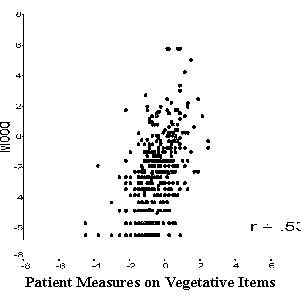
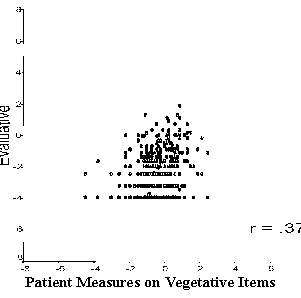
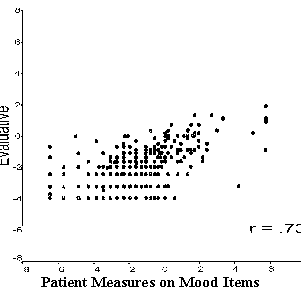
Chih-Hung Chang
Evanston Northwestern Healthcare
Nyenhuis, D. L., Luchetta, T., Yamamoto, C., Terrien, A., Bernardin, L., Rao, S. M., & Garron (in press). The development, standardization and initial validation of the Chicago Multiscale Depression Inventory. Journal of Personality Assessment.
Chung C.-H. (1998) Confirming Test Structure and Measurement Characteristics. Rasch Measurement Transactions 12:1 p. 622-3.
Confirming Test Structure and Measurement Characteristics. Chung C.-H. … Rasch Measurement Transactions, 1998, 12:1 p. 622-3.
| Forum | Rasch Measurement Forum to discuss any Rasch-related topic |
Go to Top of Page
Go to index of all Rasch Measurement Transactions
AERA members: Join the Rasch Measurement SIG and receive the printed version of RMT
Some back issues of RMT are available as bound volumes
Subscribe to Journal of Applied Measurement
Go to Institute for Objective Measurement Home Page. The Rasch Measurement SIG (AERA) thanks the Institute for Objective Measurement for inviting the publication of Rasch Measurement Transactions on the Institute's website, www.rasch.org.
| Coming Rasch-related Events | |
|---|---|
| Jan. 16 - Feb. 13, 2025, Fri.-Fri. | On-line workshop: Rasch Measurement - Core Topics (E. Smith, Winsteps), www.statistics.com |
| Apr. 8 - Apr. 11, 2026, Wed.-Sat. | National Council for Measurement in Education - Los Angeles, CA, ncme.org/events/2026-annual-meeting |
| Apr. 8 - Apr. 12, 2026, Wed.-Sun. | American Educational Research Association - Los Angeles, CA, www.aera.net/AERA2026 |
| May. 15 - June 12, 2026, Fri.-Fri. | On-line workshop: Rasch Measurement - Core Topics (E. Smith, Winsteps), www.statistics.com |
| June 19 - July 25, 2026, Fri.-Sat. | On-line workshop: Rasch Measurement - Further Topics (E. Smith, Winsteps), www.statistics.com |
The URL of this page is www.rasch.org/rmt/rmt121n.htm
Website: www.rasch.org/rmt/contents.htm